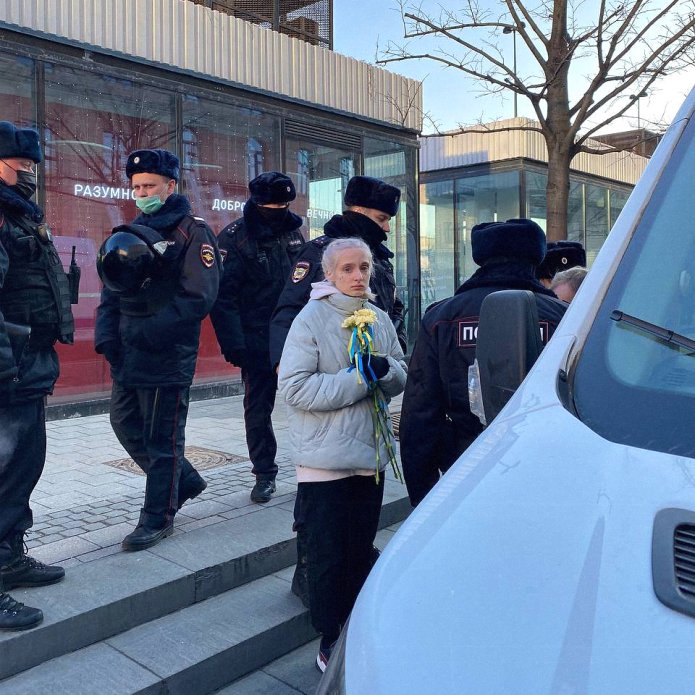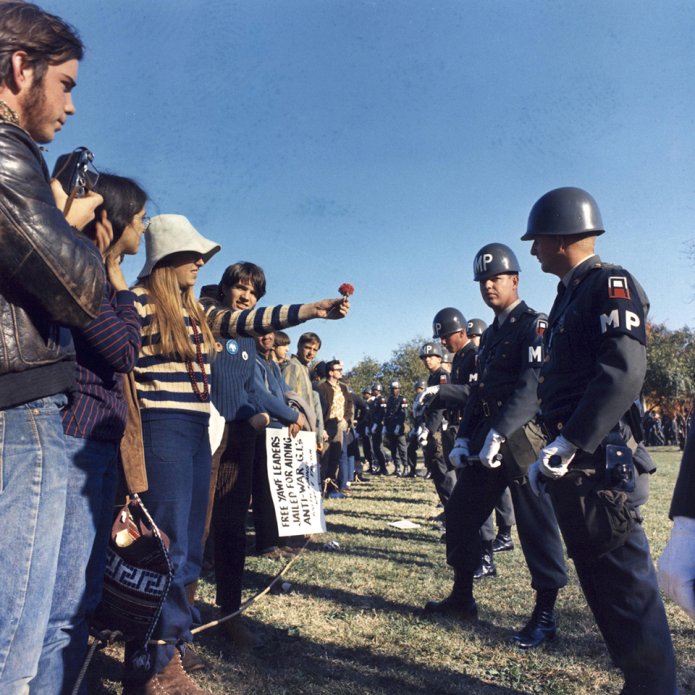At least 6,561 cases under the administrative article on «discrediting» the Russian army and authorities have been initiated since the start of the full-scale invasion of Ukraine. This article became an element of military censorship and is actively used against dissenters, even though freedom of speech is enshrined in the Constitution. This is unacceptable — we seek to abolish Article 20.3.3 of the CAO in the Constitutional Court.
About a year ago, on April 30, 2022 Maxim Filippov came to Moscow from Tula. He went to Pushkin Square carrying an anti-war poster saying «Give Peace a Chance». He stood for 15 seconds before he was arrested and taken to the local police department where an officer twisted a machine gun on the table and pointed the muzzle at the detainee «like in a Western».
Filippov is a John Lennon fan and shares the musician’s ideals. Lennon recorded and released the song «Give Peace a Chance» in 1969 with Yoko Ono and a group of friends. The single was the anthem of the anti-Vietnam War movement.
«I decided to picket in Moscow to make my protest more visible. I attended protests there at Pushkinskaya Square. That is a symbolic place».
Security officers also know Pushkinskaya Square is a centre of protest. The square has been cordoned off since the end of February. Filippov was immediately detained, his poster and documents were ripped away. «They started to shout», Filippov said, «one police officer swung at me, then said, „Don’t be afraid, we won’t beat you here“».
He was taken to the Tverskoy District Police Department on foot. The police asked him who paid him. They meant why was he protesting. Filippov said one officer called his political belief a «treason».
At the station, Filippov was taken to an empty assembly hall, where a police officer turned off his body camera and asked him the same questions.
«I decided not to talk to him and wait for a lawyer», Filippov said. «Then another officer came in. Both took off their belts, pistols, assault rifles and threw them on the table. They sat down in front of me and told me to sign some papers. I said I wanted to wait for my lawyer. They yelled at me, „People like you were shot under Stalin“. One officer turned his rifle and pointed the muzzle at me like in some Western. He put his feet on the table. Just imagine an empty assembly hall, two police officers, and that’s it. And you don’t know what might happen to you».
Filippov said when Maxim Ovchinnikov, an OVD-Info lawyer, arrived at the department, the officers changed their behaviour. «They suddenly became kind and polite».
The detainee spent three and a half hours in the police department. Then he was released with an offence on record under the article on «discrediting» the Russian army. The police didn’t explain why the «Give Peace a Chance» poster discredited the army.
The article under which Filippov was first charged and then fined 50,000 rubles (US$600) — 20.3.3 of the Code of Administrative Offenses — was introduced eight days after the full-scale invasion of Ukraine began. The article fines public actions aimed at discrediting the Russian army and state authorities. But, based on court decisions, «discrediting» means any critical statement related to the armed forces, regardless of its form and content, including general pacifist slogans. «Public» in such cases can be both private conversation and personal correspondence.
Maxim Filippov’s story is just one of many. Over the months, courts recognized a «Hug me if you are against the war» poster, positive words said in a sanitorium about Ukrainian president Volodymyr Zelensky, anti-war ribbons, and much more as violations of the article.
Since the beginning of the full-scale war, OVD-Info has counted 6,561 such cases, as well as almost 20,000 arrests in connection with anti-war positions (for rallies, publications, and other performances). In total, in 2022, courts fined Russians more than 151 million rubles (US$1,852,000) under the article for discrediting the Russian army.

OVD-Info, its lawyers and attorneys, as well as colleagues from Russia Behind Bars and Memorial appealed to the Constitutional Court of Russia with a demand to repeal Article 20.3.3 of the Code of Administrative Offences. The coalition formulated a common position for a collective complaint against individual administrative cases for more than 20 individuals.
The authors of the appeal are OVD-Info lawyers: Violetta Fitzner, Maria Nemova, and Polina Kurakina. Olga Podoplelova (Russia Behind Bars), Grigory Vaypan, and Zhargal Budaev (Memorial) also worked on the appeal. Additionally, lawyers and attorneys Sergei Podolsky, Anton Aptekar, Maria Eismont, Ekaterina Raeva, Maria Terekhova, Evgenia Ryzhkova, and Nikolai Bobrinsky are members of the coalition going to the Constitutional Court.
The coalition members insist that the article on discrediting the Russian army violates constitutional rights to freedom of conscience, assembly, thoughts, and speech, and the prohibition on establishing any state or obligatory ideology, as well as the principle of equality, and the prohibition of discrimination.
Ideological and political diversity is the foundation of the Constitution of Russia. People have the right to express their opinion and not be persecuted for it, especially by the state. The government can restrict freedom of opinion only for legitimate purposes, on an adequate scale, and within the democratic structure of society, which is set in the Constitution.
According to the authors of the complaint, Article 20.3.3 of the Code of Administrative Offences not only contradicts the values expressed in the Constitution but pursues anti-constitutional goals including the suppression of pluralism and free speech.
Lawyers indicate that the legal norm regarding discrediting was adopted as an amendment to a bill that had been previously ignored by the State Duma since June 2021. The law dealt with a completely different issue: liability in transactions with property or funds obtained by criminal means. Amendments relating to Article 20.3.3 were added to the bill, and deputies adopted them one day without substantive discussion. Subsequent amendments adding responsibility for discrediting state authorities were included in the law, not related to the bill’s original topic at all.
The coalition will appeal against the article’s first and second revisions, but it keeps growing and changing. Recently, it was amended to include discrediting private military companies.
Lawyers consider this openly discriminatory. According to the Constitution, people who criticise the use of the army and those who support it are in the same category. «Persons expressing opinions and having convictions regarding the use of the Armed Forces».
However, supporters of the «special military operation» are not persecuted. On the contrary, the state approves of their position. On March 18, 2022, more than 200,000 people attended the demonstration «For a World Without Nazism» in Moscow, where President Putin delivered his speech. It is difficult to estimate how many smaller-scale rallies took place in other regions, as well as various flash mobs and other events in support of the war. No administrative or criminal cases were initiated against any of the organisers or participants of such performances.
The goal of the appeal is a guarantee that the Constitutional Court will express an opinion on a wide range of cases at once. According to Violetta Fitsner, one of the authors of the complaint, if the court considers only one case, for example, for the «No War» poster, it could ignore all the other statements that are now recognized as «discrediting.» This would not solve the problem on a national scale.
In addition to Maxim Filippov quoting John Lennon, OVD-Info and the coalition are acting in the interests of Olga Aptysheva, who was fined 50,000 rubles (US$600) for displaying a poster with the phrase «I am horrified by what the Russian government is doing to our closest friend and our country. Please stop the war. I don’t want to be afraid of the future» on a white, blue and white background.
Another claimant, Kristina Shatryuk from the Krasnoyarsk region, was detained on March 6, 2022. She displayed a poster «15 years for „NO WAR“?!» (this is the maximum penalty under Article 207.3 of the Criminal Code on «fakes» about the Russian army — OVD-Info) in the town of Ilanskoye. The court fined her 30,000 rubles (US$350). According to Shatryuk, the judge himself asked, «What kind of article is this anyway?» and then called someone from the conference room to find out what to do. The girl heard this conversation because it was quiet in court. The hearing was held on Sunday, a few hours after her detention.
Evgenia Isayeva, an artist from St. Petersburg, was fined 45,000 rubles (US$550) for staging an anti-war performance on the steps of the city parliament in St. Petersburg on her birthday in March 2022. The girl poured red paint on herself and repeated «my heart is bleeding» until she was taken away to a police bus. «How can people be judged for thoughts, for words? Everyone has the right to hold their opinion, this is our right under the Constitution, even under the amended one», Isaeva said. «I had a „clean“ record, and I understood I had one chance not to go to prison and say as loudly as possible what I and many others think and feel».
The complaint also argues that the punishment for expressing an anti-war belief is disproportionate. Fines exceed the minimum wage in Russia, and for a repeated violation of the administrative article, a criminal case may be opened against a person under Part 1 of Article 280.3 of the Criminal Code.
The authors of the complaint refer to historical examples and practices in other countries. During the war in Afghanistan, pacifists were persecuted in the USSR. Nevertheless, there was no separate law similar to the article on discrediting the Russian army in the Administrative Code. Later, in the 90s, the Russian state rehabilitated all those who had been persecuted.
During the Chechnyan wars, there were numerous public discussions in minor and major Russian media outlets. Participants referred to both the First and the Second Chechen Wars — both the «Operation to Restore Constitutional Order» (1994 — 1996), and the «Counter-Terrorism Operation» (1999 — 2000) — as «wars», and substantial criticism was levelled at the actions of the authorities and military. Since December 1994, the Democratic Choice of Russia party has taken a publicly anti-war stance, and anti-war protests were held in Moscow in 1995 and 2000. None of these actions resulted in any administrative or criminal sanctions.
In Nazi Germany, people were prosecuted for their anti-war stance under the laws «against treacherous attacks on the State and Party...», «undermining military force», and «treason amendment». Members of the anti fascist group White Rose were given the death penalty for distributing anti-war leaflets on February 22nd, 1943. Subsequently, all decisions on those laws were cancelled. In 2012, the Russian Orthodox Church canonised one of the members of the White Rose group — Alexander Shmorel under the name of Saint Alexander Munich.
Similar laws that limit the distribution of information about military forces exist in the USA, for instance, Espionage Act and Smith Act. However, they have not been applied since 1951, despite mass protests against military operations in Vietnam, Afghanistan and Iraq.
American authorities suppressed protests and dispersed anti-war rallies. They used formal violations, not the content of slogans. Professor of Law Thomas I. Emerson notes in his book Freedom of Expression in Wartime that it became «explicit that general resistance to war and defence efforts are protected by the Constitution, no matter how vigorously it is expressed».

An appeal to the Constitutional Court is the last hope for justice, taking into account that Russia no longer implements The European Court of Human Rights’ decisions. Lawyers say the appeal is the last hope not just for the 20 claimants, but for thousands of people who were persecuted in accordance with the obviously unfair and distorted norm.
«War, repressions, violation of human rights… It is very challenging to remain an optimist, but we assume that we work for long term results», said Violetta Fitsner. «We understand that it is very unlikely that the Constitutional Court will listen to us and say „yes, this article is bad, let’s cancel it completely“. It should be this way in a democratic state. But we feel that the Court will interpret it and limit the application, and people will be prosecuted less. We will have a legal assessment, which we can use. If we do nothing, there won’t be any change for us nor for the people after us».
Maxim Filippov, who stood in the solitary picket with a John Lennon quote for 15 seconds, recalls that in court (the first instance — OVD-Info) he felt «at an exam with his least favourite teacher»: «The judge sits, leaning back and swaying, and you can see that she doesn’t care. The conveyor works, and she just churns the same decisions out». The Constitutional Court is an opportunity for the judicial system to stop this or at least slow it down.
As authors of the claim say, the Constitutional Court used to solve various issues. A decision of the Constitutional Court equalised child victims who lived with their parents in detention facilities to victims of repression. It also acknowledged the right to a jury trial for women in 2016. The Constitutional Court upheld the complaint of Sami Andrey Danilov who challenged the ban of traditional hunting for the representatives of indigenous peoples who moved to cities from their traditional homelands.
Nevertheless, executive power does not always listen to the opinion of the Constitutional Court. In the case of Ildar Dadin, the first person convicted under Article 212.1 of the Criminal Code on repeated violations for organising a political action, the Constitutional Court decided that the article was in accordance with the Constitution, but it should be used only if the imputed «violation» posed a danger to society. Two weeks after that, the Supreme Court overturned Dading’s sentence and released him.
However, security forces continued to use the «Dadin’s» article to put pressure on opposition activists simply by formally identifying a public threat where there was none. For example, in September 2019, civil activist Konstantin Kotov was sentenced under Article 212.1 to four years in a general regime corrective colony. After appealing to the president and another complaint to the Constitutional Court, the prosecutor’s office still considered the sentence too harsh, and when the case was re-examined on appeal, the court reduced the term to one and a half years.
«Now we are using all possible methods to protect our rights and show that civil society and human rights defenders in Russia are alive. We have not been broken, despite all the repressions and laws. The state can liquidate organisations, recognize them as „foreign agents“, but we will all continue to work and speak out about it. We hope that democracy will exist in the „beautiful Russia of the future“, human rights will not be just words, and the Constitution will not be just a piece of paper», said Fitzner.
In her opinion, with which the other authors of the complaint agree, the use of the army abroad is a critically important issue. Russian citizens have the right to have an opinion on this issue and to express it. Regardless of their opinion, they form the Russian people, which is the source of power in the state. This is also spelled out in the Constitution.
People’s beliefs cannot be ranked by the State as right or wrong, preferred or undesirable, and criticism of the use of armed forces cannot be grounds for stigmatisation and ostracism.
The people for whom the complaint is filed have various attitudes to the prospect of their cases being considered in the Constitutional Court. For some of them, more than a year has passed since their offence. Russian life has changed a lot.
Kristina Shatryuk, for example, does not expect anything from her case in the Constitutional Court, but if everything goes well, will mark this day in the calendar as a holiday. Together with her husband, Kristina continues to struggle with urban problems and the inaction of police officers in Ilansk.
Artist Evgenia Isaeva believes that if there is at least an opportunity to defend the truth, then you need to use it. Now she is engaged in humanitarian assistance to refugees in Russia. Olga Aptysheva took several courses at human rights schools following her detention.
Maxim Filippov left for the USA. He settled there and has no plans to return to his homeland, even if the Constitutional Court decides to cancel the article on discrediting the army.
OVD-Info Team



